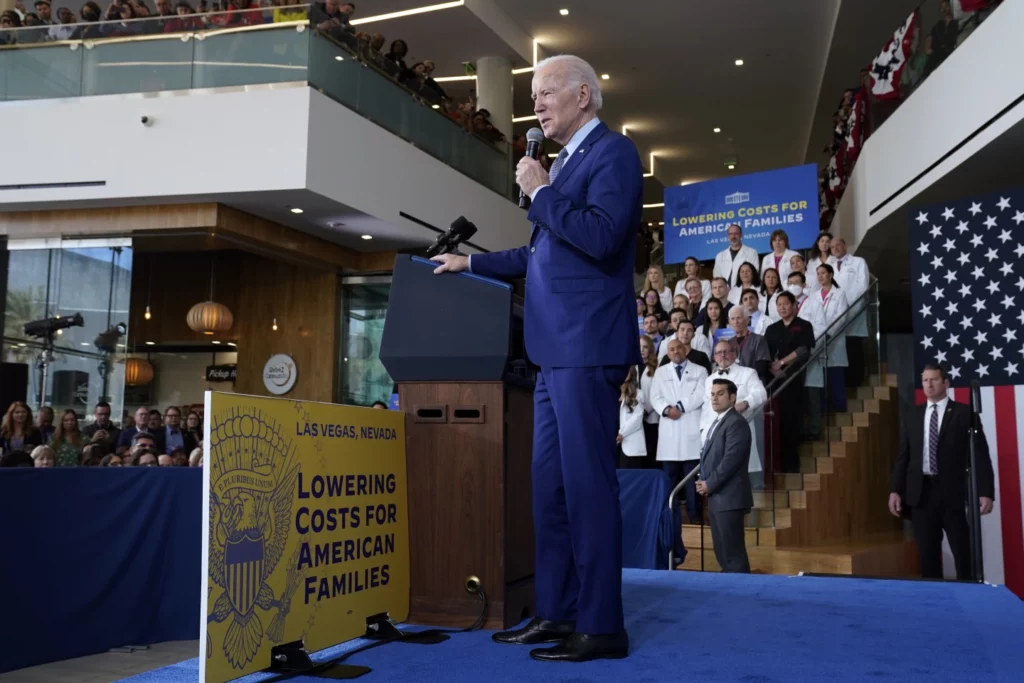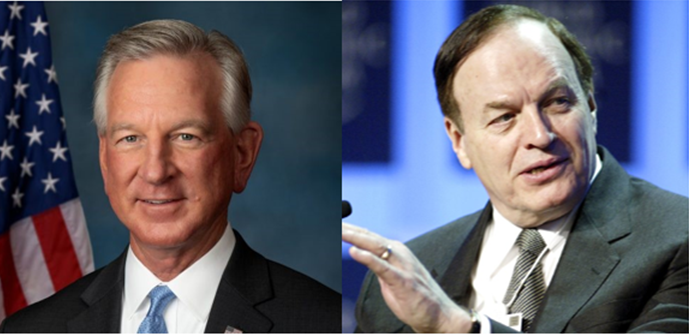Biden administration to target drugs for price negotiations to lower Medicare costs

President Joe Biden’s administration will announce on Tuesday the first prescription drugs being targeted by the U.S. government for price negotiations as part of an effort to lower Medicare costs. The announcement is a significant step under the Inflation Reduction Act, which was signed by Biden last year. The law requires the federal government for the first time to start negotiating directly with companies about the prices they charge for some of Medicare’s most expensive drugs. The process has drawn legal challenges from drugmakers and heavy criticism from Republicans in Congress. It’s also a centerpiece of Biden’s reelection pitch as he seeks a second term in office by touting his work to lower costs for Americans at a time when the country has struggled with inflation. Biden plans to deliver a speech on health care costs from the White House after the announcement. He’ll be joined by Vice President Kamala Harris. More than 52 million people who are either 65 or older or have certain severe disabilities or illnesses get prescription drug coverage through Medicare’s Part D program, according to the Centers for Medicare and Medicaid Services, or CMS. About 9% of Medicare beneficiaries age 65 and older said in 2021 that they did not fill a prescription or skipped a drug dose due to cost, according to research by the Commonwealth Fund, which studies healthcare issues. CMS aims to negotiate the lowest maximum fair price for drugs on the list released Tuesday. That could help some patients who have coverage but still face big bills like high deductible payments when they get a prescription. Currently, pharmacy benefit managers that run Medicare prescription plans negotiate rebates off a drug’s price. Those rebates sometimes help reduce premiums customers pay for coverage. But they may not change what a patient spends at the pharmacy counter. The new drug price negotiations aim “to basically make drugs more affordable while also still allowing for profits to be made,” said Gretchen Jacobson, who researches Medicare issues at Commonwealth. Drug companies that refuse to be a part of the new negotiation process will be heavily taxed. The pharmaceutical industry has been gearing up for months to fight these rules. Already, the plan faces several lawsuits, including complaints filed by drugmakers Merck and Bristol-Myers Squibb and a key lobbying group, the Pharmaceutical Research and Manufacturers of America, or PhRMA. PhRMA said in a federal court complaint filed earlier this year that the act forces drugmakers to agree to a “government-dictated price” under the threat of a heavy tax and gives too much price-setting authority to the U.S. Department of Health and Human Services. PhRMA representatives also have said pharmacy benefit managers can still restrict access to drugs with negotiated prices by moving the drugs to a tier of their formulary — a list of covered drugs — that would require higher out-of-pocket payments. Pharmacy benefit managers also could require patients to try other drugs first or seek approval before a prescription can be covered. Republican lawmakers also have blasted the Biden administration for its plan, saying companies might pull back on introducing new drugs that could be subjected to future haggling. They’ve also questioned whether the government knows enough to suggest prices for drugs. CMS will start its negotiations on drugs for which it spends the most money. The drugs also must be ones that don’t have generic competitors and are approved by the Food and Drug Administration. CMS plans to meet this fall with drugmakers that have a drug on its list, and government officials say they also plan to hold patient-focused listening sessions. By February 2024, the government will make its first offer on a maximum fair price and then give drugmakers time to respond. Any negotiated prices won’t take hold until 2026. More drugs could be added to the program in the coming years. Republished with the permission of The Associated Press.
Richard Shelby disagrees with Joe Biden; inflation not under control

U.S. Senate Richard Shelby commented on the economy after stocks fell on Tuesday due to growing concerns about inflation and likely future Federal Reserve rate hikes. “Today’s CPI report contradicts what Democrats want Americans to believe,” Shelby said on Twitter. “Inflation is not under control, and the economy is not back on track. Grocery prices are up 13.5% from last year, gas prices are still too high, electricity costs more, and Dems are still spending recklessly.” The White House planned for President Joe Biden to give a speech on Tuesday extolling the economy under his watch and the passage of the Inflation Reduction Act last month. Apparently, someone at the White House forgot that the August inflation report was due out that same day. While the President was speaking about the Inflation Reduction Act. According to the latest U.S. Bureau of Labor Statistics report, prices continued to climb in August by .1% across categories. On average, prices rose 8.3% year to date. Food was up 11.4% over this time a year ago, and energy has continued to soar even with declining fuel prices. Because Tuesday’s report Consumer Price Index number showed that inflation was still a problem – even with dropping fuel prices, the new heightened inflation fears on Wall Street. The bad news on inflation triggered a mass selloff on the stock market. The inflation numbers triggered a selloff in all 30 of the Dow component stocks because investors believe that the inflation problem will lead to more interest rate hikes by the Federal Reserve. There is rampant speculation that the Federal Reserve Board of Governors may respond to the August CPI data with the largest interest rate hike in forty years. Tuesday’s selloff was the worst single day for stocks since June 2020. High-interest rates affect the stock market and investor confidence because it means that capital is more expensive to purchase, limiting corporate profits and stock value growth. “Exactly four weeks ago today, I signed the Inflation Reduction Act into law, the single most important legislation passed in the [this] Congress to combat inflation and one of the most significant laws in our nation’s history, in my view,” Biden said in his speech on Tuesday. “I said it then, and I’ll keep saying it: With this law, the American people won, and special interest lost. Say it again: The American people won, and special interest lost.” “Folks, we’re going to lower prescription drug costs, lower health insurance costs, lower energy costs for millions of families,” Biden said. “And we are going to take the most aggressive action ever, ever, ever to confront the climate crisis and increase our energy security — ever in the whole world. (Applause.) And that’s not hyperbole; that’s a fact.” Shelby is retiring at the end of the year when his current term ends. Shelby was first elected to the Senate in 1986, following eight years representing the Seventh Congressional District in the House of Representatives. Shelby began his legendary political career representing Tuscaloosa in the Alabama State Senate, winning election in 1970 and re-election in 1974.
Richard Shelby, Alabama policy group differ on Inflation Reduction Act

One Republican senator from Alabama and one policy group share differing opinions on the Inflation Reduction Act. The measure, which passed the U.S. Senate late Sunday night with Vice President Kamala Harris casting the deciding vote, is a $740 million taxation and spending bill that is designed to combat climate change and allow the federal government to cap prices on certain prescription medications. The U.S. House is expected to take up a vote on the measure this week. U.S. Sen. Richard Shelby, R-Ala., who serves as vice chairman of the Senate Appropriations Committee, said the act will result in increased costs for Americans, and will negatively impact families’ budgets and savings. “Democrats are spending hundreds of billions of dollars to raise taxes and swell the cost of living while the American people are enduring record-high inflation and a declining economy,” Shelby said in a release. “This makes no sense. Right now, Congress should be focused on reducing costs and growing economic investment, not spending $80 billion to double the size and scope of the IRS and hundreds of billions of dollars to combat climate change.” Shelby said the policies that would be created under the bill “are not what Americans” want or need, expressing his disappointment that his Democratic colleagues in Washington are supporting the legislation. Under the bill, there would be no new taxes on families who earn less than $400,000 per year, and no new taxes on small businesses. In addition, the bill would give the U.S. Health and Human Services the authority to cap prices on certain prescription medications while providing $30 million in tax credits to encourage green energy. Meanwhile, Alabama Arise said the bill will be a boon to state residents. Robyn Hyden, who serves as executive director of the policy group focused on improving lives of residents in the state, said the bill would better the quality of life of state residents. “The Inflation Reduction Act will help build a healthier future for people across Alabama,” Hyden said in a statement. “This plan will make health coverage more affordable for hundreds of thousands of Alabamians and millions of Americans. It will improve air quality by investing in clean energy and reducing emissions that fuel climate change. And it will pay for these investments by closing tax loopholes that subsidize profitable corporations and wealthy households.” Alabama Arise said the bill will help save money or patients, in addition to the federal government, by permitting Medicare to “negotiate certain prescription drug prices. “It will cap the cost of insulin and other out-of-pocket drug expenses for Medicare enrollees,” Hyden said in the release. “And it will extend enhanced subsidies that make health coverage more affordable for many of the 219,000 Alabamians with marketplace plans through the Affordable Care Act.” Republished with the permission of The Center Square.
Senators Tommy Tuberville and Richard Shelby slam ‘reckless’ tax package

On Sunday, the U.S. Senate passed the Inflation Reduction Act in a partisan 51-50 vote. Vice President Kamala Harris cast the tie-breaking vote after an all-night session. The bill includes the largest-ever federal effort on climate change, caps out-of-pocket drug costs for seniors on Medicare to $2,000 a year, and extends expiring subsidies that help 13 million people afford health insurance. According to the AP, the whole package is paid for, with some $300 billion in extra revenue for deficit reduction by raising corporate taxes and reaping savings by allowing the government to negotiate drug prices for Medicare. U.S. Senator Tommy Tuberville and Richard Shelby released statements after voting against the Democrats’ spending package. The Senators attempted to file amendments to the bill, including making Donald Trump-era tax cuts for the middle class permanent and amendments to secure American energy independence by requiring approval of all pending major pipeline projects and offshore drilling permit requests. “Democrats have once again put their own agenda ahead of helping hardworking Americans. This latest tax and spend spree will further increase inflation and raise taxes on families at a time when they can least afford it,” stated Tuberville. “I worked with my Republican colleagues to offer commonsense amendments to this package that would cut taxes, slash regulations, stand up to China, and bolster our national security. Unfortunately, Senate Democrats shot down these proposals and forced through a bill that does nothing to improve or grow our economy. Instead, their bill provides funding for their Green New Deal policies, sends American businesses overseas, and doubles the size of the IRS, giving the agency more manpower to go after small business and the middle class.” Senator Shelby argued the package would increase costs for Americans. “The so-called ‘Inflation Reduction Act’ will result in increased costs for hardworking Americans, further crushing families’ budgets and savings,” Shelby stated. “Democrats are spending hundreds of billions of dollars to raise taxes and swell the cost of living while the American people are enduring record-high inflation and a declining economy. This makes no sense. Right now, Congress should be focused on reducing costs and growing economic investment, not spending $80 billion to double the size and scope of the IRS and hundreds of billions of dollars to combat climate change.” “The policies created in this legislation are not what Americans want, nor are they what Americans need. I am disappointed that my Senate Democratic colleagues supported this legislation knowing it fails the American people,” Shelby concluded. President Joe Biden released a statement after the bill’s passage. “Today, Senate Democrats sided with American families over special interests, voting to lower the cost of prescription drugs, health insurance, and everyday energy costs and reduce the deficit, while making the wealthiest corporations finally pay their fair share. I ran for President promising to make government work for working families again, and that is what this bill does — period,” Biden stated.


